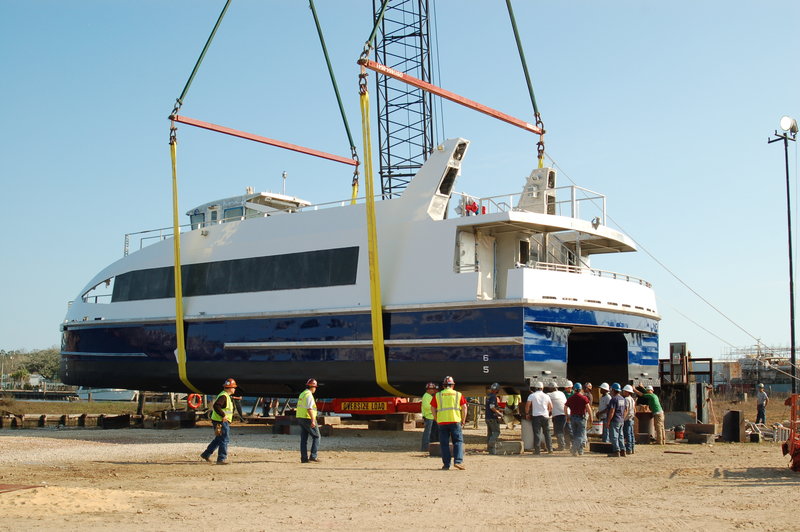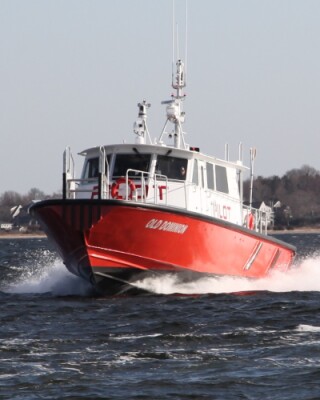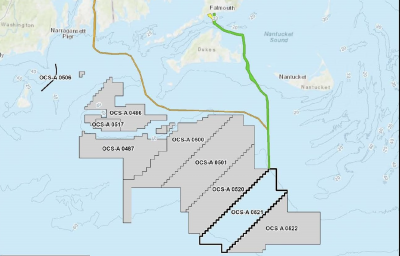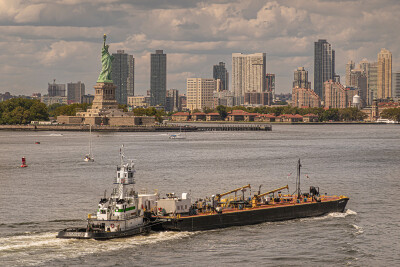Two starring projects at Horizon Shipbuilding Inc. – its NYC Ferry passenger catamarans, and a quartet of powerful new 100’ tugs for McAllister Towing and Transportation Co. Inc. – are big factors in the company’s decision to seek bankruptcy protection.
Horizon officials warned in late September that revenue shortfalls from their contract with HNY Ferry Fleet LLC, operator of NYC Ferry and a subsidiary of San Francisco-based Hornblower Cruises & Events, could force the Bayou La Batre, Ala., shipyard to file a reorganization plan under Chapter 11 bankruptcy after it had delivered a 10th ferry under that contract.
In recent days, documents filed with the federal Alabama Southern Bankruptcy Court in Mobile, Ala., show how Horizon also came up short of money in its construction of four 100’x40’, 6,770-hp tugs to help New York-based McAllister handle the new generation of neo-Panamax containerships calling at New York and other East Coast ports.
The first of those tugs meeting Tier 4 emission requirements, the Capt. Brian A. McAllister, was delivered last summer. The most powerful tractor tug in the McAllister fleet, it has been working in New York Harbor.
Now McAllister is a creditor in Horizon's Chapter 11 proceedings, with secured claims totaling around $14.6 million and unsecured claims for $6.3 million, under a November 2015 contract with the shipyard, according to a motion filed with the court on Nov. 1 by lawyers for McAllister.
Horizon had been working on the next two tugboats in the four-vessel order, and McAllister had been making progress payments on those boats, the motion states.

The Capt. Brian A. McAllister, the first Tier 4 tugboat on the East Coast, was delivered last summer by Horizon Shipbuilding. McAllister Towing photo.
Neither of those boats have been completed, and in the weeks before filing for bankruptcy, Horizon “ceased all work on such vessels, citing its financial inability to continue without a major restructuring of the pricing and payment terms of the shipbuilding agreement,” according to the motion. At least two subcontractors have asserted liens against one of the undelivered tugs in an effort to get paid for their work, and McAllister expects it will need to protect its interests from demands from other unpaid Horizon vendors, the lawyers wrote.
In a recent statement, Horizon Shipbuilding president Travis R. Short explained how the two high-profile projects ran into problems.
“Our attempt at building 10 ferries in 12 months was widely perceived as impossible. However, we were confident in our ability to make the deliveries, which we did,” Short wrote. “On the NYC Ferry project we were given an estimate from the customer that in many ways resembled our own estimate, which provided a level of comfort prior to start of production.
“Halfway through the project (February of this year), we realized we would be experiencing many more labor hours than originally budgeted. Shortly thereafter the substantial use of contract labor was also necessary to support the extremely aggressive delivery schedule. Hornblower was immediately notified of the financial issues and Horizon diligently attempted to find a solution.”
Likewise, the McAllister tugs incurred higher than expected costs, particularly with the Tier 4 power and emissions package, said Short.
“In the performance of the McAllister project Horizon did not fully appreciate the extent of what was required to deliver the newly designed Tier 4 McAllister ASTs. The resulting labor and material costs for one the first Tier 4 installations in the country were much higher than anticipated for a firm fixed-price contract without price modification.”
The bankruptcy court filings list dozens of creditors, from the American Bureau of Shipping to small tool and welding suppliers. Some of the biggest hits fall on subcontractors for the NYC Ferry project – Horizon’s first venture into the passenger ferry sector, showing off its prowess in aluminum construction, its Gordhead design and production software system, and an aggressive, ahead-of-time delivery schedule.
The arrival of the first boats in early spring 2017 allowed New York City Mayor Bill de Blasio’s administration to roll out the subsidized public ferry and its $2.75 fare a month early on May 1. Despite growing pains, the NYC Ferry was an immediate success, booking 2 million riders in its first three months.
But in the meantime, financial worries were growing around the Alabama shipyard, said Nick Beaver, president of Kamcor Inc., the largest subcontractor on the ferry project. Based in Chesapeake, Va., Kamcor brought its workers to Alabama to perform much of the welding and shipfitting work on the ferries.
“This was a big project for us. This was something we were going to hang our hat on,” said Beaver, who contacted New York City officials to offer Kamcor as a subcontractor for building the vessels.
Beaver said he was in contact with Hornblower and Horizon on a daily basis during construction, and had added another 70 to 80 workers in May and June to ensure on-time delivery. He had learned “discussions started in March” over costs between Hornblower and Horizon, and understood there had been assurances Hornblower could subsidize labor costs, Beaver said.
“I was getting paid right up until I started on (vessel) 206,” said Beaver. Hornblower offered a partial settlement on that vessel to get a lien release from Kamcor, said Beaver, but he resisted.
“From there, it went silent,” said Beaver. He said Kamcor was owed at least $750,000 and probably much more after all its expenses are totaled.
“This could put me out of business,” he said.
In a statement, Hornblower officials said their company “has (and had) no legal relationship whatsoever with Kamcor, with respect to this project.
“Our contractual relationship was with Horizon, and we have fulfilled all of our obligations under that contract. As for Horizon’s current situation, we wish them well and would be willing to work with them in the future, should their situation change.”
If that happens, Beaver said, he won’t be part of it: “I wouldn’t have anything to do with Hornblower.”
Short said possible price adjustments on the NYC Ferry order and possibly on future vessels were discussed with Hornblower and city officials until the tenth boat was delivered in September.
“Unfortunately, these price adjustments never came to fruition and Horizon was forced to suspend normal operations shortly after this delivery,” he said.
“Our vendor and subcontractor partners are also greatly affected and we will make every effort to protect their interests as well. Horizon has had the privilege of taking part in two of the most celebrated new construction projects in the recent memory,” Short wrote. “We must now restructure and have an approved plan to move forward.”
Given the soft shipbuilding market, Short said he anticipates “a moderate recovery, but recovery remains our goal. Unfortunately Horizon is experiencing a back to back loss and a Chapter 11 filing that most shipyards can appreciate but, at the end of the day, we are as good as any boatbuilder out there.”





